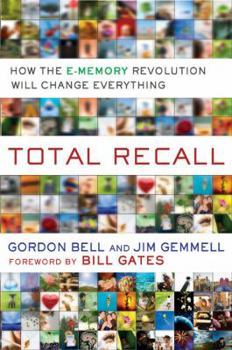Total Recall
What if you could remember everything? Gordon Bell and Jim Gemmell draw on experience from the MyLifeBits project at Microsoft Research to explain the benefits to come from an earthshaking and inevitable increase in electronic memories. In 1998 they began using Bell, a luminary in the computer world, as a test case, attempting to digitally record as much of his life as possible. Photos, letters, and memorabilia were scanned. Everything he did on his computer was captured. He wore an automatic camera, wore an arm-strap that logged his biometrics, and began recording telephone calls. This experiement, and the system they created to support it, put them at the center of a movement studying the creation and enjoyment of e-memories. Since then the three streams of technology feeding the Total Recall revolution - digital recording, digital storage, and digital search - have become gushing torrents. We are capturing so much of our lives now, be it on the date - and location - stamped photos we take with our smart phones or in the continuous records we have of our e-mails, instant messages, and tweets - not to mention the GPS tracking of our movements many cars and smart phones already do automatically. We are storing what we capture either out there in the 'cloud' of services such as Facebook or on our very own increasingly massive and cheap hard drives. But the critical technology, and perhaps the least understood, is our magical new ability to find the information we want in the mountain of data that is our past. And not just Google it, but data mine it so that, say, we can chart how much exercise we have been doing in the alst four weeks in comparison with what we did four years ago. In health, education, work life, and our personal lives, the Total Recall revolution is going to change everything. As Bell and Gemmell show, it has already begun. Total Recall is a technological revolution that will accomplish nothing less than a transformation in the way humans think about the meaning of their lives.
Format:Hardcover
Language:English
ISBN:0525951342
ISBN13:9780525951346
Release Date:September 2009
Publisher:Dutton Books
Length:288 Pages
Weight:1.26 lbs.
Dimensions:1.1" x 6.4" x 9.1"
Age Range:18 years and up
Grade Range:Postsecondary and higher













